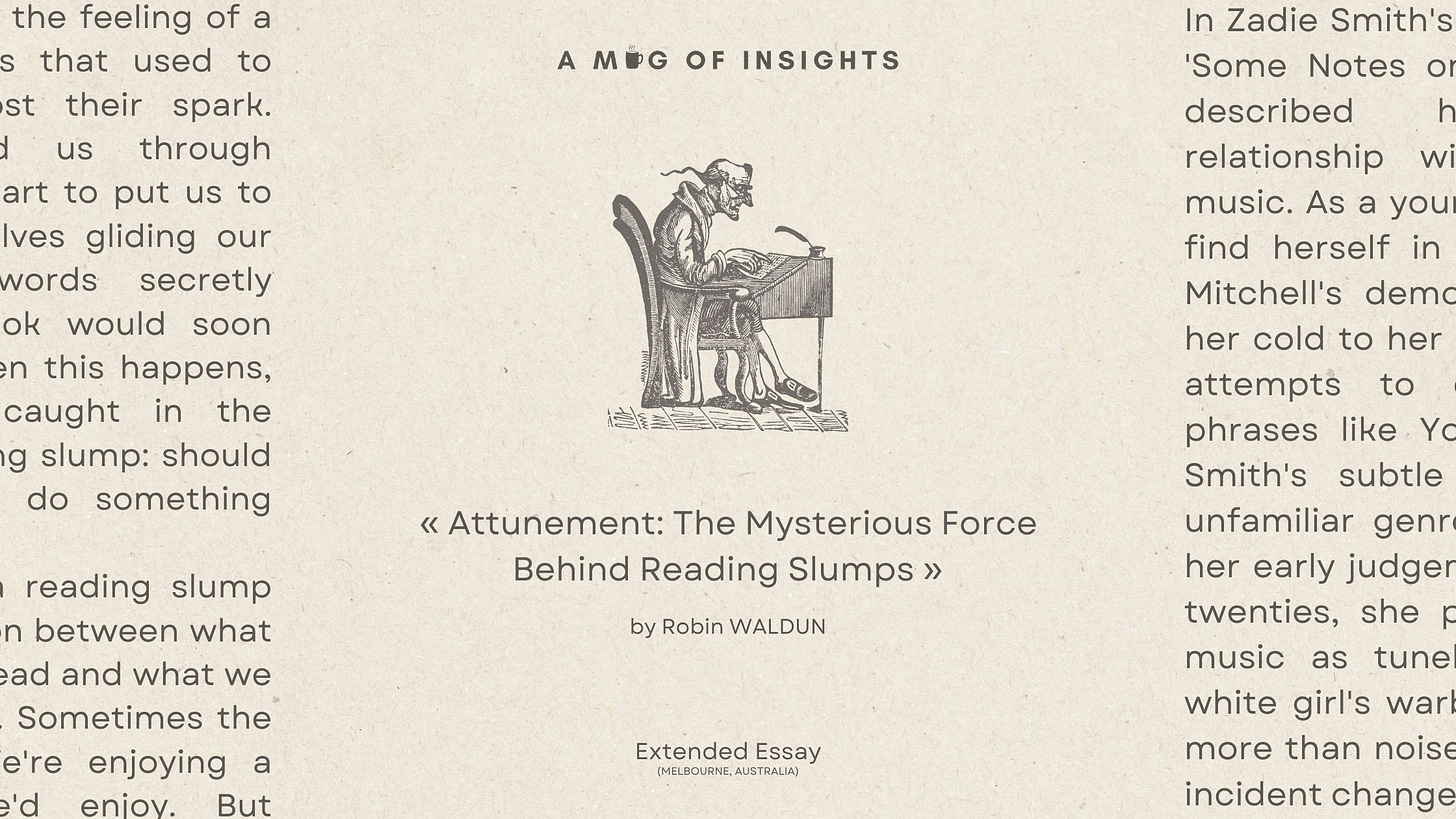Attunement: The Mysterious Force Behind Reading Slumps
Why Are We Attached to Certain Books and Not Others?
This is another post for paid subscribers. Paid members will get access to the full archive and all of my extended essays with further reading lists. And on average, subscribers will get 50% more posts from our regularly scheduled program. This will give me more time (alongside grad school research) to produce high-quality posts consistently. Thank you for your contribution!
We're all familiar with the feeling of a reading slump. Books that used to enchant us have lost their spark. Stories that pulled us through hundreds of pages start to put us to sleep. We find ourselves gliding our eyes across the words secretly wishing that the book would soon come to an end. When this happens, we find ourselves caught in the dilemma of the reading slump: should we keep reading or do something else?
Generally speaking, a reading slump stems from the tension between what we think we want to read and what we actually want to read. Sometimes the two worlds align. We're enjoying a book we think we'd enjoy. But sometimes they don't and we find ourselves straining against our instincts. As Robert Escarpit wrote, the "cultured man" who knows Racine will never be so foolhardy as to admit that what he really loves is Tintin (cited in Felski 53)1. We find it hard to swallow our pride and ditch a book we don't enjoy because we don't want to admit that we've misjudged our own taste.
This toil has a pretty obvious solution: we need to remain open and adjust our reading habits to what we're attuned to. In other words, we need to read the right book at the right time to fully enjoy it. But to achieve this, we have to understand how attunement works.
Zadie Smith: "The first time I heard her I didn't hear her at all"
In Zadie Smith's article in The New Yorker: 'Some Notes on Attunement', she described her complicated relationship with Joni Mitchell's music. As a young girl, Smith didn’t find herself in the milieu of Joni Mitchell's demographic, rendering her cold to her college classmates' attempts to convert her with phrases like You don't like Joni?! Smith's subtle resistance to an unfamiliar genre of music formed her early judgements, where in her twenties, she perceived Mitchell's music as tuneless, discordant, a white girl's warbling that was little more than noise (48). But a striking incident changed her view forever.
When Smith was in her thirties, she found herself in a car with her husband, travelling to a wedding in Wales. She was in a foul mood because she didn't want to make a brief stop at Tintern Abbey: all she wanted was a sausage roll from a service station. She fixed her eyes on the moving hills outside the car, and an incredible moment of attunement occurred:
"As I remember it, sun flooded the area; my husband quoted a line from one of the Lucy poems; I began humming a strange piece of music", "humming Joni, not yet conscious of the transformation".
From this moment onward, Smith turned from someone who allegedly hated Joni Mitchell to someone who tears up whenever her music comes on the radio.
Just like Smith, we can find plenty of instances when we're suddenly attuned to a piece of music. Sometimes it happens after listening to a crush's favourite song on repeat. Sometimes it happens when a bus ride suddenly feels like a movie scene over a shuffled tune. In any case, a sudden rupture happens at the site of attunement. We're liberated from an old way of perceiving the world based on habitual loops. We fall in love with a fresh new world through our new favourite song.
The same goes for reading. Attunement happens when a book sucks us in, depriving the oxygen in our surroundings. We find ourselves zeroed in, bewitched and quite unable to stop turning the pages. These moments usually make up our fondest memories of reading under the cover when we were young, and upon opening a new book when we're older, we secretly wish that it would enchant us and make the mundane world disappear again.
However, time and time again, we find it impossible to evoke that old familiar feeling. We start to force ourselves through boring pages or to leave them as door stoppers. As enough of these uninspired books start to pile up, we start to panic: have we lost our touch? The answer is, of course, no. In terms of attunement, books seem to be a little trickier to deal with than music.
Textual attunement vs. Sensory attunement
Keep reading with a 7-day free trial
Subscribe to A Mug of Insights to keep reading this post and get 7 days of free access to the full post archives.





